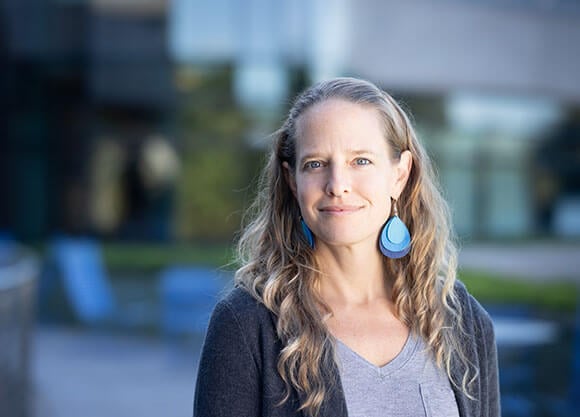
Social work professor dedicates life to giving a voice to the voiceless
September 27, 2023

September 27, 2023

Kelly, an associate professor of social work who has taught at the university since 2014, had helped to conceive of this unique learning opportunity that blended the students’ perspectives with those of some formerly incarcerated community leaders — “three areas of expertise that had a lot to teach other,” Kelly said.
But during a break in their fieldwork, one of Kelly’s social work students, Pedro Silva ’21, MSW ’23, alerted her to the presence of a nearby woman who was slumped over and unresponsive, the result of an apparent overdose.
Kelly, who said she’s always carried Narcan ever since she began working as a volunteer with the Sex Workers and Allies Network (SWAN), quickly administered it, saving the woman’s life.
Her actions that day are just one of the many reasons why Kelly will be honored in October as one of the three faculty recipients of the university’s Excellence in Teaching Award.
She is an ally and an advocate for survivors of interpersonal and systemic violence, for currently or formerly incarcerated people and for other marginalized populations — and her passion makes a lasting impression on her students.
Silva, who specializes in crisis management, detailed Kelly’s heroism in a beautifully written nomination letter.
“While I know she may be surprised by the nomination, the ability to exemplify our profession and represent the campus is in her spirit and in her character,” Silva wrote. “She doesn’t just make a difference in her students’ lives — I’ve seen her save one as well.”
Silva’s suspicion about how his teacher would receive the news was spot-on. Kelly said she was nearly moved to tears when Elicia Spearman, general counsel and vice president for human resources, interrupted an impromptu, department-wide meeting to inform her of the honor. President Judy Olian and Provost Debra Leibowitz soon joined what turned into a celebration of Kelly’s accomplishments and offered their congratulations.
“I was so honored,” Kelly said. “It’s very humbling to know that a student nominated me and then to learn that my colleagues supported me. Your job as a professor is to support your students and to teach and to bring the passion that you have for your field to the table. To have someone stop me and say, ‘hey, people are recognizing what you’re putting into this’ — it’s a really humbling thing.”
Kelly was described in a 2021 Quinnipiac Magazine story as “a cornerstone of The Prison Project,” an interdisciplinary program in which she teaches trauma-informed mindfulness in Connecticut prisons while raising awareness about mass incarceration and other social justice initiatives. Drawing on her own experiences as a teen runaway who saw firsthand how her whiteness affected interactions with the authorities, she encourages her students to consider social issues through a more inclusive and compassionate lens. It’s about adopting an “us” mentality instead of grouping anyone in a “those people” category, she told the magazine.
In addition to her coursework, Kelly operates a private practice in which she primarily works with survivors of violence. She also has membership with the New Haven Women’s Resettlement Working Group, the New Lifestyles Women Empowerment Community and Next Level Empowerment Program.
Working at Quinnipiac affords her the opportunity to bridge the gap between the campus and the community, bringing a real-world element to the classroom and vice versa.
“What I have really appreciated about the university is the flexibility and encouragement to really broaden out from the scope of the meaning of scholarship and service,” Kelly said. “I have never been dissuaded from building the community partnerships that I've been able to build. And out of those partnerships, we’ve been able to bring people into the classroom and bring students into the community with constant encouragement. I'm a very relationally based therapist and professor and community member. And to be able to bring all of these areas together — the prison community and the academic community — I don’t know how possible that would be anywhere else.”
Quinnipiac Today is your source for what's happening throughout #BobcatNation. Sign up for our weekly email newsletter to be among the first to know about news, events and members of our Bobcat family who are making a positive difference in our world.
Sign Up Now